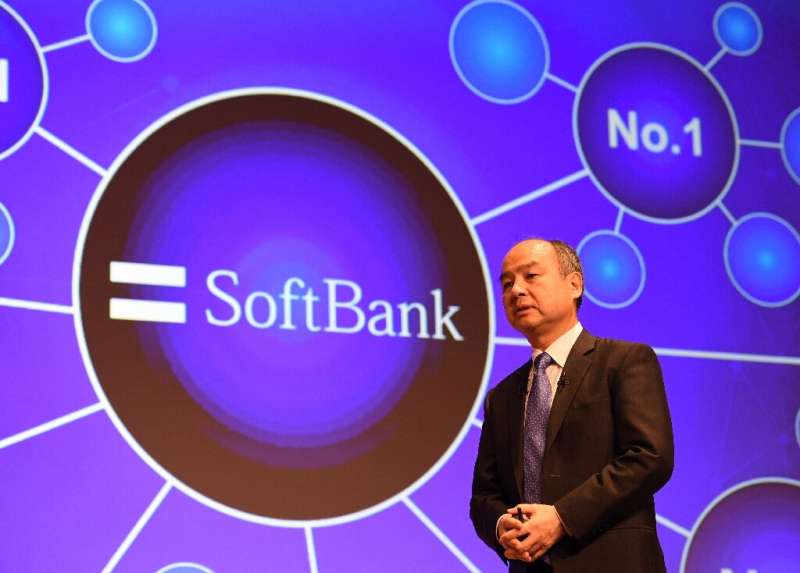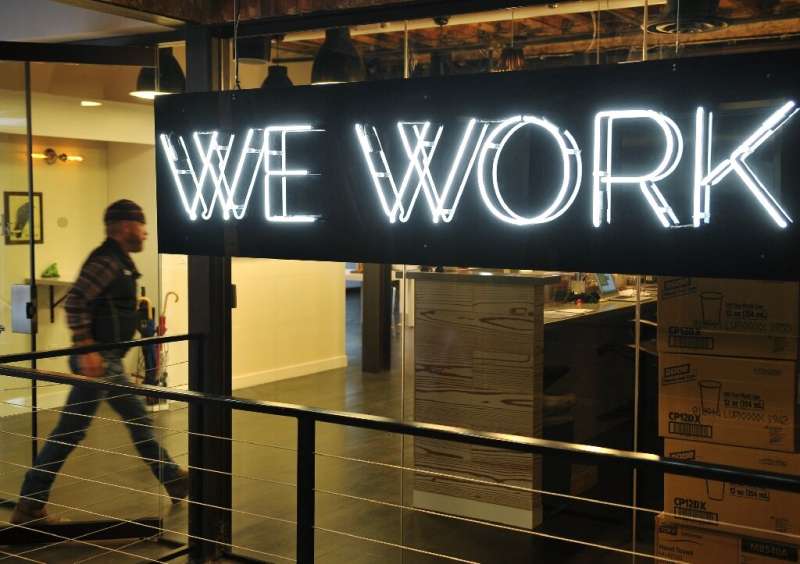Hard landing for SoftBank? WeWork woes raise questions

SoftBank Group CEO Masayoshi Son is no stranger to controversy, but a meltdown at WeWork has sparked pointed questions about whether his enormous investments and futuristic pronouncements are more style than substance.
It has been a tough year for Son, who transformed a firm that began in software into a powerful tech investor that backs some of Silicon Valley's most well-known start-ups.
"He is a gambler," said Marc Einstein, chief analyst for telecommunications and digital services at ITR Corporation, a research firm.
"He has made more money than anyone else in Japan, but he is also losing more money than anyone."
In May, there was the disappointing IPO of one of its marquee investments Uber, which has seen its shares drop almost 30 percent since their debut.
And there have been tough questions about SoftBank's ties with Saudi Arabia—a key partner in the firm's $100 billion Vision Fund—after the murder of journalist Jamal Khashoggi at the kingdom's Istanbul consulate.
SoftBank's long-mooted Vision Fund 2 was announced in July, with Apple, Microsoft and Foxconn on board. But other deep-pocketed investors from the first round, including Saudi Arabia and the United Arab Emirates, were nowhere to be seen.
Son has reportedly encouraged SoftBank executives themselves to take out huge loans to invest in the fund.
But it is the fiasco at WeWork that has some analysts questioning the Son's acumen.
So far, the office-sharing start-up's CEO Adam Neumann has stepped down, the firm's offering valuation target has been slashed by more than half, and its mooted IPO is said to be unlikely before early 2020 at the soonest.

'A gambler'
The disaster has some reassessing the myth of "tech-guru" Son, who has dazzled investors and analysts alike with a series of savvy bets.
Son's crowning glory remains his $20 million investment in Chinese tech giant Alibaba, which ended up worth $50 billion.
He also defied naysayers to take over the struggling Japanese arm of Vodafone for 1.75 trillion yen ($16.3 billion at current exchange rates), leaving SoftBank Mobile with a quarter of the Japanese market.
His risk-taking has often been hailed as a breath of fresh air in cautious Japan, but now some question whether it has led to missteps.
"The size and pace at which SoftBank made its investments raises issues of whether it paid close attention to the usual valuation metrics," wrote Barry Ritholtz, a Bloomberg Opinion columnist and chairman of Ritholtz Wealth Management.
"Perhaps the Vision Fund allowed the hype to get the best of its assumptions about future growth and singular domination by these companies."
In July, S&P Global Rating warned after the Vision Fund 2 announcement that the firm's "extremely aggressive growth strategy and underlying financial policy... are likely to continue to restrain its credit quality."
'High-risk strategy'
For all the current turmoil, there is little sign of self-doubt from Son, with the Financial Times reporting SoftBank may offer WeWork an extra $1 billion.

The deal would reduce the price at which SoftBank acquires WeWork stock, increasing its stake.
And some analysts cautioned against counting Son out too quickly, pointing to his broad portfolio, and the inherent risks of the start-up world.
"I feel it's too early to make a judgement," said Makoto Sengoku, market analyst at Tokai Tokyo Research Centre.
"SoftBank's investments, are not, I don't think, about making profits in six months or in one year."
Tomoaki Kawasaki, a senior analyst at Iwai Cosmo Securities, pointed out the first Vision Fund has performed well as a whole, despite headline-making let-downs.
"Fundamentally, there is no change to the scenario that SoftBank is sweeping up promising companies around the world for growth, particularly in the area of AI," he said.
"Among Japanese business leaders, there are not a lot of people who try to see into the future and grow businesses. Mr. Son plays that role," Sengoku said.
And Einstein pointed out that the wide spread of Son's investments gives him cover.
"It's a high-risk strategy where he will invest in 100 companies, but only one will be the next Alibaba," he said.
"If the other 99 go out of business, it doesn't matter."
© 2019 AFP





















